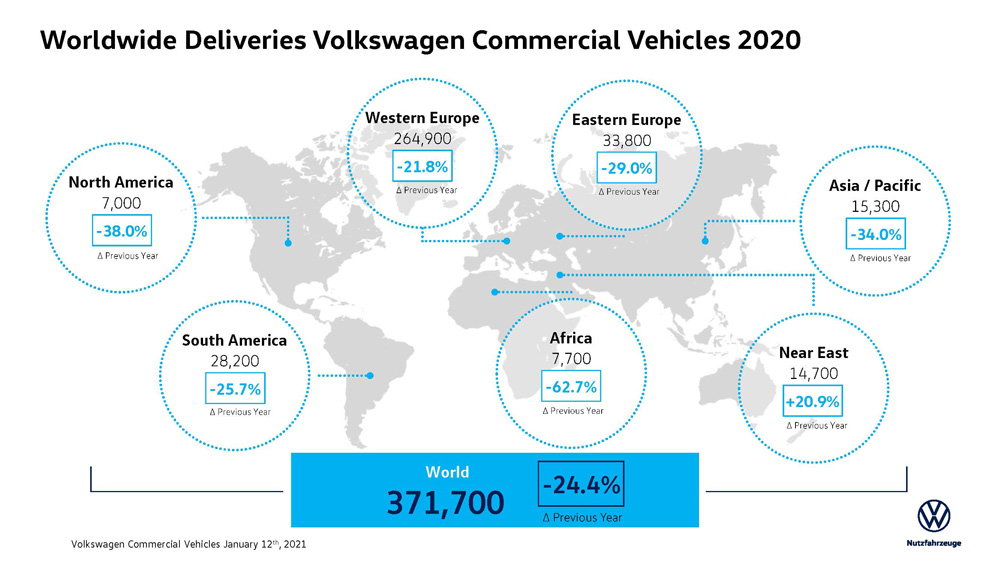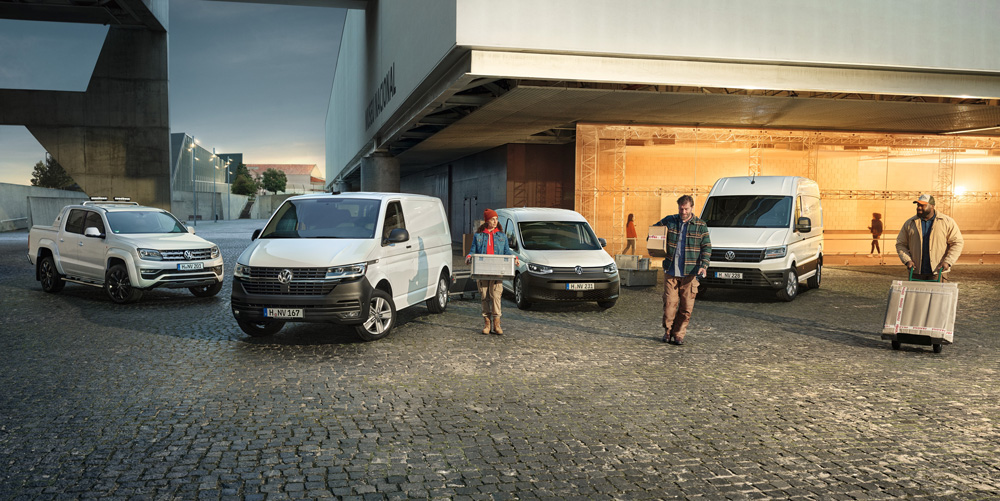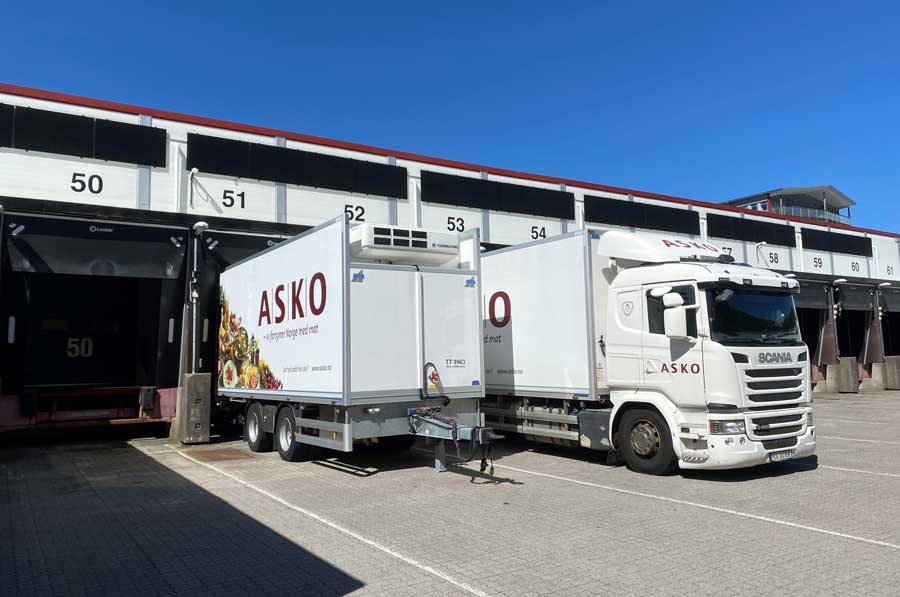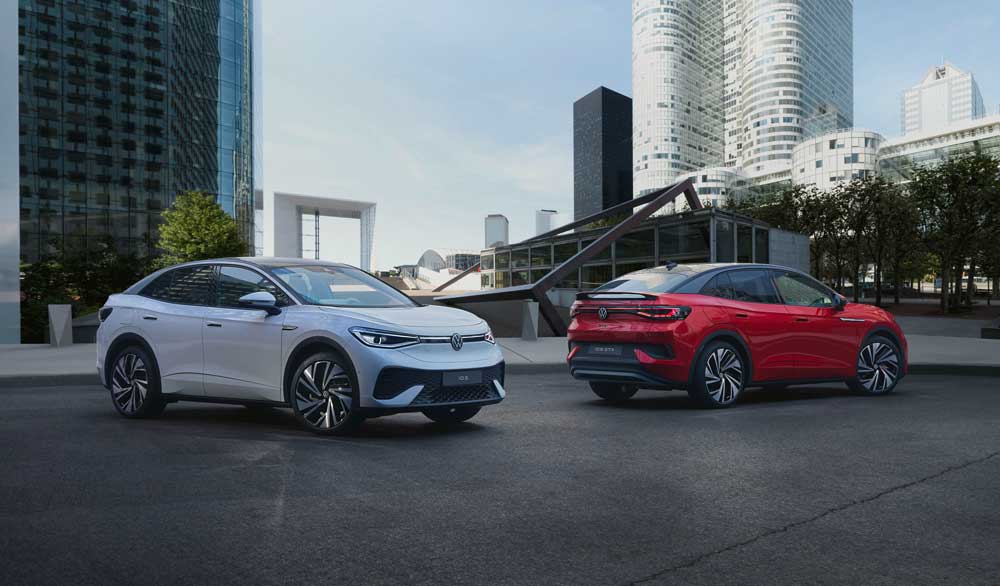As elsewhere, the year 2020 was defined at Volkswagen Commercial Vehicles (VWCV) too by the course of the Covid-19 pandemic and the associated economic downturns and social restrictions. In total, VWCV delivered 371,700 vehicles to customers in 2020, 24.4 per cent down on the previous year. Across the course of the year the trend ran in parallel with the course of the coronavirus pandemic: the first quarter was only slightly down on 2019, but was then followed by significant falls in the second quarter during the first lockdown, with plant closures at VWCV and production stopped for several weeks. Over the summer, units shipped rose again appreciably, culminating in a year-on-year increase of 13.3% in September, the only month of the year to finish ahead of the corresponding month in 2019. In the final months of the year, it was not possible to continue this positive trend – reflecting the increasing infection numbers and renewed business restrictions.
Units shipped by region
Western Europe: The brand delivered a total of 264,900 vehicles to customers here (previous year 338,600; -21.8%). With a total of 101,000 vehicles (previous year 126,600; -20.2%), Germany remains VWCV’s strongest single market, followed by Great Britain with 36,500 vehicles (previous year 48,200; -24.3%) and France with in total 15,900 units (previous year 20,300; -21.5%).
Eastern Europe: In Eastern Europe VWCV delivered 33,800 (previous year 47,600; -29.0%). The strongest individual market remains Poland with 9,600 vehicles (previous year 14,200; -32.1%).
North and South America: In Mexico, VWCV’s only North American market, the company delivered 7,000 vehicles (previous year 11,300; -38.0%). In South America the picture is split: while in the overall market region units shipped fell be 25.7 per cent to 28,000, the situation in Brazil, with a fall of 43.8 per cent to 10,600 vehicles, was particularly badly hit by the coronavirus pandemic. In Argentina on the other hand there was a rise of 1.9 per cent to 12,900 vehicles for the year as a whole (previous year 12,700).
Asia/Pacific: With 10,500 vehicles shipped (previous year 13,900; -24.5%), Australia remains VWCV’s strongest market in the Pacific region. At 15,300 vehicles in total, the region was 34.0 per cent down year-on-year in 2020. VWCV is not active in the Chinese market, so the quick recovery of the market there had no effect on the company.
Africa: Starting from a low level (20,700 in 2019), the year-on-year drop in Africa to 7,700 vehicles in 2020 was in percentage terms, at 62.7 per cent down, a very considerable one. The strongest individual market remains South Africa with 4,300 vehicles (-48.3% year-on-year).
Middle East: With an increase of 20.9 per cent, the Middle East was the only region as a whole in which VWCV achieved year-on-year growth in 2020. This was attributable to the positive development in the Turkish market, where, after a big downturn in 2019, sales returned to their previous level with 12,500 vehicles shipped and thus a growth of 31.7 per cent.

Deliveries by product line
In 2020, VWCV unveiled the new Caddy, which by the year-end was already in initial dealerships in Germany and selected European countries. The first few trade magazine road tests certify that its handling and safety features make the new Caddy the benchmark in its segment. In the middle of 2020, production of the Amarok at the Hannover plant came to an end. The new version of the Volkswagen pick-up, based then on the agreed cooperation with Ford, will make its world premiere in 2022. Some vehicles, including VWCV’s California models, benefited during the coronavirus pandemic from the trend towards camping holidays. Orders received for the models based either on the T-series or Crafter, increased in total to 27,400, a year-on-year rise of 60.8 per cent. With a total of 1,100 e-Crafter units shipped, the share of fully electric vehicles at VWCV grew further to 2,700 vehicles (+167.4%). With the new Multivan VWCV will be presenting the latest generation of T-models with plugin hybrid drive system in 2021 while the fully electric ID.BUZZ, the electrified reinterpretation of the legendary Bulli icon will follow in 2022.
T-series 145,000 (-24.7%)
Caddy 112,000 (-27.3%)
Amarok 52,100 (-28.1%)
Crafter 61,700 (-13.0%)
Electric models 2,700 (+167.4%)










